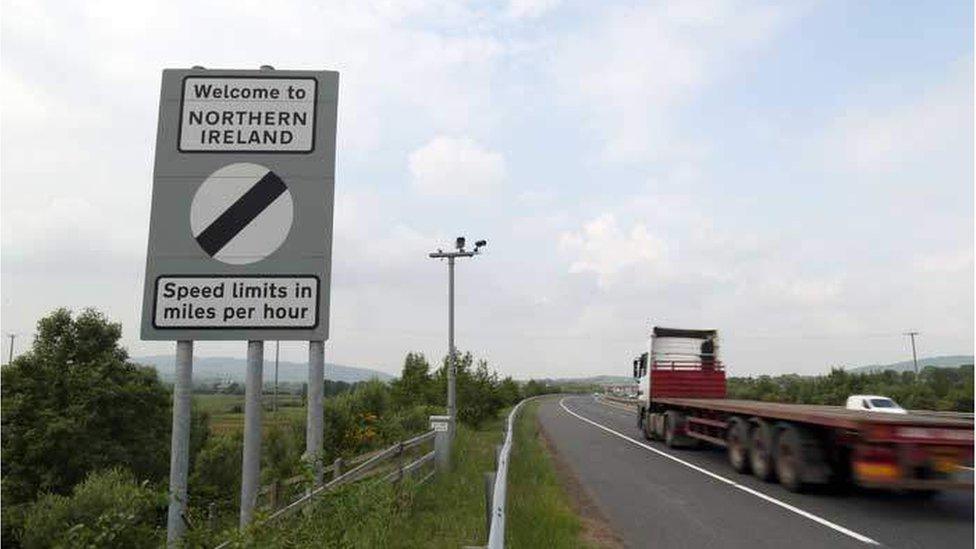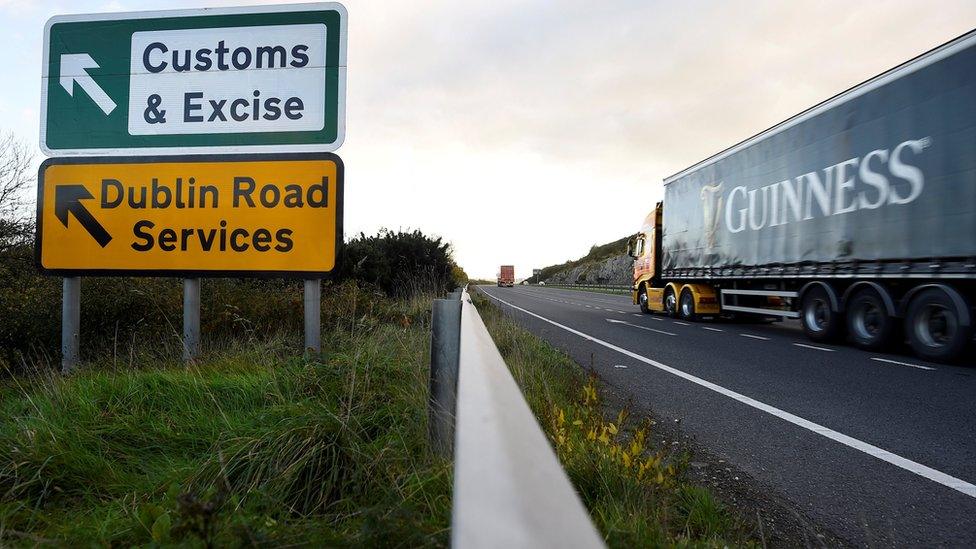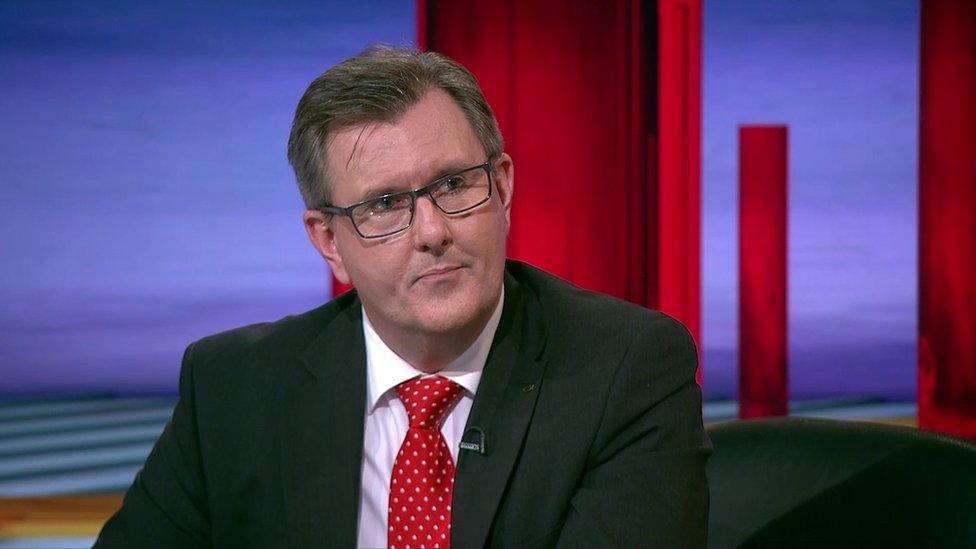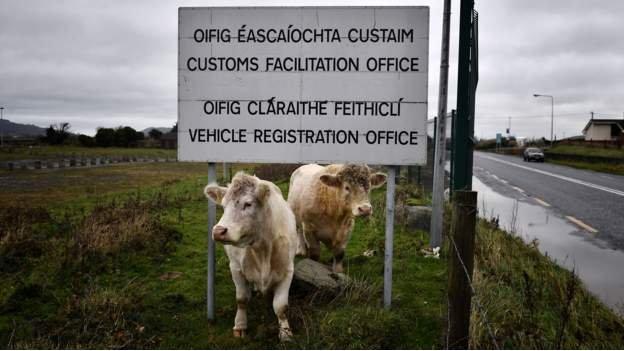Backstop: An opportunity or a threat?
- Published

The backstop will apply if a wider deal cannot be reached
The draft withdrawal deal between the EU and UK contains a 'backstop' which would mean Northern Ireland continuing to follow many rules of the EU's single market.
It would apply if a wider deal cannot keep the Irish border as frictionless as it is now.
Business leaders in Northern Ireland broadly welcomed it and said it would be better than no deal.
The DUP said it will damage Northern Ireland's democracy and economy.
What economic threats and opportunities could it present?
Why is the backstop needed?
It is there to make sure that there are no customs, regulatory or VAT barriers ,which would mean that goods have to be checked as they cross the Irish border.
If a trade deal is struck which gives the whole of the UK deep access to the single market, the backstop would not be needed and Northern Ireland would be no different or better off than anywhere else in the UK.
Confused by Brexit jargon? Reality Check unpacks the basics.
Alternatively, there could be a looser relationship between the EU and the whole of the UK, including Northern Ireland, but technical fixes would keep the Irish border frictionless.
The looser relationship is the preferred option for many Brexit supporters, but has been repeatedly dismissed as unworkable by the EU.
If the trade deal or the technical fix aren't enough then the backstop would kick in.
What would the backstop do?
It would mean Northern Ireland would align with the EU single market on goods standards, agricultural production and veterinary controls.
The whole of UK would form a single customs territory with the EU but Northern Ireland alone would follow the full EU customs code.
What opportunities could that give Northern Ireland?
It would mean that Northern Ireland, compared to the rest of the UK, would have a competitive edge in trade with the EU.
Northern Ireland businesses could then get their goods into the single market in essentially the same way they do today.
Businesses elsewhere in the UK would face new barriers.
What about customs?
The UK would form a single customs territory with the EU but Northern Ireland alone would follow the full EU customs code.
BBC News NI's political reporter Jayne McCormack explains why the border is an issue
That would mean that that Northern Ireland businesses would face no new customs barriers on EU trade.
Businesses in the rest of the UK would not face tariffs but would face additional administrative burdens.
What standards do we conform to?
In a backstop situation, Northern Ireland would align with EU standards on goods, while the rest of the UK would not.
That could mean non-Northern Ireland businesses facing higher barriers to trade with the EU.
The most onerous standards concern food and agricultural products, so conceivably 100% of Welsh lamb or Scottish beef shipments going into the EU would require documentary and physical checks.
By contrast, Northern Ireland products would just sail through just as they do today.
How about VAT?
In a backstop, Northern Ireland will be required to remain aligned to EU VAT rules in respect to goods.
That will allow Northern Ireland to have continued access to the EU's VAT Information Exchange System, while the rest of the UK would not.

The Irish border is the last outstanding issue in the Brexit withdrawal negotiations
The practical consequence of that is for businesses in the EU which import from the UK.
Imports from Great Britain could be liable for VAT at the point of entry. Imports from Northern Ireland would not.
The upside
Taken together those customs, regulatory and VAT issues mean it will be easier for businesses in NI to sell into the EU, compared to their GB rivals.
What's more, the UK government has said it will not impose any new barriers to trade on goods moving from NI into GB.
That could potentially make NI an attractive location for manufacturers who want to serve both the UK and the EU.
Potential downsides
The backstop will mean new regulatory barriers between GB and NI - the so-called Irish Sea border.
The EU has promised that any checks on goods will be minimised, but it seems certain it would mean checks on food products at ports of entry.
Would you notice if you crossed the Irish border? (Video from 2017)
That could increase cost and complexity for retailers and distributors.
Goods moving between the other parts of the UK will face no such barriers.
Do NI businesses have any say in these rules?
Northern Ireland businesses will be following EU rules with little ability to influence those rules.
If the EU was to propose a new rule which could damage a part of the NI economy then, at best, NI businesses could be consulted through the EU-UK committee which will oversee the backstop.
There will be no government to work the EU system on behalf of Northern Ireland, unless the Irish government helps out.
Will NI subject to state aid rules?
Some, including NI's inward investment agency, had hoped that Brexit would allow greater leeway in what sort of state support could be given to businesses.
But the backstop would mean Northern Ireland would still be directly subject to EU state aid rules.
However, it is not clear that NI would be less competitive than the rest of the UK in this regard.
That is because the UK has agreed to set up an independent state aid enforcement authority, which will work in close cooperation with the European Commission.
The Commission will have legal standing before UK courts and the right to intervene in cases.
So in practice very similar state aid rules are likely to apply across the whole of the UK.
- Published16 November 2018

- Published15 November 2018

- Published16 October 2019
